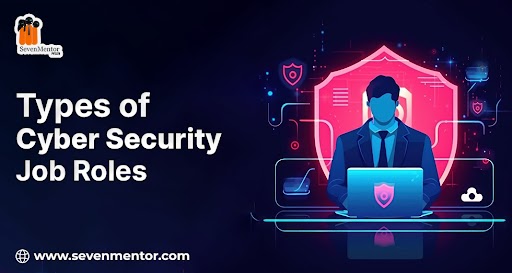Types of Cyber Security Job Roles
The scope of cybersecurity is both broad and deep, reflecting its critical importance across virtually all sectors in today’s digitally dependent world. With the proliferation of data breaches, ransomware attacks, and various forms of cybercrime, the demand for skilled cybersecurity professionals has never been higher. This demand spans various aspects of the field, including but not limited to, protection, detection, response, and recovery from cyber incidents. Here’s a closer look at the Types of cyber Security Job Roles:
Career Opportunities
The career opportunities in cybersecurity are vast and varied, ranging from technical roles like penetration testers and security engineers to strategic positions such as cybersecurity analysts and consultants. Specializations can include network security, application and software security, incident response, digital forensics, and cybersecurity policy and governance.
Industry Demand
Virtually every industry requires cybersecurity professionals to protect its information and systems. Key sectors include finance, healthcare, government, defense, retail, and technology. The growth of the Internet of Things (IoT) has also extended the need for cybersecurity to manufacturing, automotive, and home environments.
Evolving Threat Landscape
The cybersecurity field is constantly evolving in response to an ever-changing threat landscape. Cybersecurity professionals must continually learn and adapt to new challenges, such as emerging forms of malware, ransomware, phishing schemes, and state-sponsored cyberattacks.
Advancements in Technology
With advancements in technology, such as cloud computing, artificial intelligence (AI), and machine learning, cybersecurity strategies and tools are also evolving. Professionals in the field must stay abreast of these developments to effectively protect against and respond to cyber threats.
Global Impact
Cybersecurity is a global issue, with threats that can originate from anywhere and affect systems worldwide. This global nature offers professionals the chance to work on international teams, understand global cybersecurity policies, and tackle challenges on a worldwide scale.
For Free Demo classes Call: 020 7117 2515
Registration Link: Click Here!
Regulation and Compliance
An increasing number of laws and regulations around data protection and privacy, such as the General Data Protection Regulation (GDPR) in Europe and various state laws in the U.S., have expanded the scope of cybersecurity. Professionals must not only protect systems but also ensure compliance with these legal requirements.
Education and Training
The field offers a wide range of educational and training opportunities, including formal degrees, professional certifications, and online courses. Continuous learning is a key aspect of a career in cybersecurity, given the field’s rapid pace of change.
Innovation and Research
There is significant scope for innovation and research in cybersecurity, with opportunities to develop new security technologies, techniques, and solutions. This can range from academic research to startup ventures focused on cybersecurity products and services.
Social and Ethical Implications
Cybersecurity also encompasses important social and ethical considerations, including privacy rights, the ethical use of data, and the societal impacts of cyber threats and cyber warfare.
Different Job Profiles in Cyber Security
Cybersecurity is a rapidly expanding field, reflecting the growing importance of protecting information and systems in the digital age. As technology evolves, so do the threats, making cybersecurity a critical concern for businesses, governments, and individuals alike. This field offers a variety of roles, each addressing different aspects of cybersecurity. Here’s a look at some of the key job roles within cybersecurity:
Cybersecurity Analyst:
This role involves monitoring an organization’s network security breaches and investigating when a breach occurs. Analysts are responsible for implementing and maintaining security measures to protect an organization’s computer systems and networks.
Security Consultant:
Security consultants are the advisors and assessors of the cybersecurity world. They help businesses identify vulnerabilities in their systems and suggest measures to mitigate risks. Consultants might work across various industries, providing tailored advice to each client.
Penetration Tester (Ethical Hacker):
Penetration testers, or ethical hackers, are authorized to break into systems and networks to discover vulnerabilities that malicious hackers could exploit. This role is critical in identifying and fixing security flaws before they can be exploited.
Information Security Manager:
An information security manager oversees the security policies and procedures within an organization. They are responsible for managing a team of IT professionals to ensure that an organization’s information assets are protected against unauthorized access or alterations.
Chief Information Security Officer (CISO):
The CISO is a senior-level executive within an organization responsible for establishing and maintaining the enterprise vision, strategy, and program to ensure information assets and technologies are adequately protected. The CISO directs staff in identifying, developing, implementing, and maintaining processes across the organization to reduce information and IT risks.
For Free Demo classes Call: 020 7117 2515
Registration Link: Cyber Security Course in Pune!
Cybersecurity Engineer:
Cybersecurity engineers design and implement secure network solutions to protect against hackers, cyberattacks, and other persistent threats. They also test and monitor these systems regularly to ensure that they are up-to-date and secure against emerging threats.
Incident Responder:
Incident responders are cybersecurity professionals who are called upon after a security breach or attack has been detected. Their primary responsibility is to contain and mitigate the attack, recover any compromised data, and secure the system from future attacks.
Forensic Analyst:
Forensic analysts are involved in investigating cybercrimes and breaches. They collect and analyze data related to unauthorized security incidents, helping to identify the perpetrators and understand the methods of attack to prevent future breaches.
Security Architect:
A security architect is responsible for designing, building, and overseeing the implementation of network and computer security for an organization. They create complex security structures – and ensure that they function effectively.
Security Software Developer:
Security software developers integrate security into applications software during the design and development process. They may develop security software or incorporate security measures into existing applications.
Do watch our video on Cyber Security: Click Here
Author:-
Rajat Sharma
Call the Trainer and Book your free demo Class For Cyber Security
Call now!!!
| SevenMentor Pvt Ltd.
© Copyright 2021 | SevenMentor Pvt Ltd.

